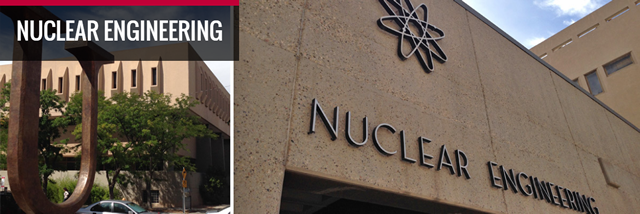
Nuclear Engineering ETDs
Publication Date
7-9-2009
Abstract
The use of stochastic spectral expansions, specifically generalized polynomial chaos (gPC) and Karhunen-Loeve (KL) expansions, is investigated for uncertainty quantification in radiation transport. The gPC represents second-order random processes in terms of an expansion of orthogonal polynomials of random variables. The KL expansion is a Fourier-type expansion that represents a second-order random process with known covariance function in terms of a set of uncorrelated random variables and the eigenmodes of the covariance function. The flux and, in multiplying materials, the k-eigenvalue, which are the problem unknowns, are always expanded in a gPC expansion since their covariance functions are also unknown. This work assumes a single uncertain input—the total macroscopic cross section—although this does not represent a limitation of the approaches considered here. Two particular types of input parameter uncertainty are investigated: The cross section as a univariate Gaussian, log-normal, gamma or beta random variable, and the cross section as a spatially varying Gaussian or log-normal random process. In the first case, a gPC expansion in terms of a univariate random variable suffices, while in the second, a truncated KL expansion is first necessary followed by a gPC expansion in terms of multivariate random variables. Two solution methods are examined: The Stochastic Finite Element Method (SFEM) and the Stochastic Collocation Method (SCM). The SFEM entails taking Galerkin projections onto the orthogonal basis, which yields a system of fully-coupled equations for the PC coefficients of the flux and the k-eigenvalue. This system is linear when there is no multiplication and can be solved using Richardson iteration, employing a standard operator splitting such as block Gauss-Seidel or block Jacobi, or a Krylov iterative method, which can be preconditioned using these splittings. When multiplication is present, the SFEM system is non-linear and a Newton-Krylov method is employed to solve it. The SCM utilizes a suitable quadrature rule to compute the moments or PC coefficients of the flux and k-eigenvalue, and thus involves the solution of a system of independent deterministic transport equations. The accuracy and efficiency of the two methods are compared and contrasted. Both are shown to accurately compute the PC coefficients of the unknown, and numerical proof is provided that the two methods are in fact equivalent in certain cases. The PC coefficients are used to compute the moments and probability density functions of the unknowns, which are shown to be accurate by comparing with Monte Carlo results. An analytic diffusion analysis, corroborated by numerical results, reveals that the random transport equation is well approximated by a deterministic diffusion equation when the medium is diffusive with respect to the average cross section but without constraint on the amplitude of the random fluctuations. Our work shows that stochastic spectral expansions are a viable alternative to random sampling-based uncertainty quantification techniques since both provide a complete characterization of the distribution of the flux and the k-eigenvalue. Furthermore, it is demonstrated that, unlike perturbation methods, SFEM and SCM can handle large parameter uncertainty.
Keywords
Transport theory--Statistical methods., Neutron transport theory--Statistical methods., Collocation methods., Finite element method., Uncertainty--Mathematical models.
Sponsors
U.S. Department of Energy Nuclear Engineering and Health Physics Fellowship Program; Los Alamos National Laboratory
Document Type
Dissertation
Language
English
Degree Name
Nuclear Engineering
Level of Degree
Doctoral
Department Name
Nuclear Engineering
First Committee Member (Chair)
Coutsias, Evangelos
Second Committee Member
de Oliveira, Cassiano
Third Committee Member
Warsa, James
Recommended Citation
Fichtl, Erin D.. "Stochastic methods for uncertainty quantification in radiation transport." (2009). https://digitalrepository.unm.edu/ne_etds/51
